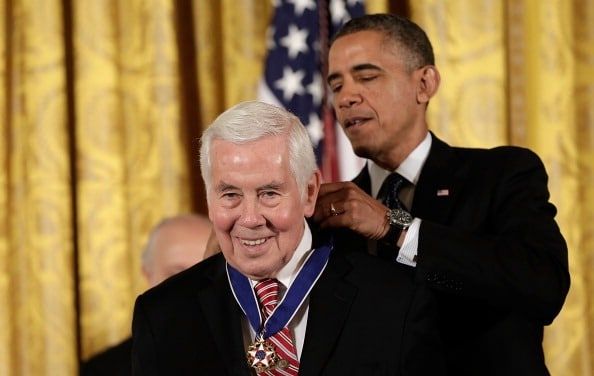Senator Richard G. Lugar: An appreciation
By William Tobey | April 30, 2019
 President Obama awards the Presidential Medal of Freedom to former Sen. Richard Lugar in November 2013. (Photo by Win McNamee/Getty Images)
President Obama awards the Presidential Medal of Freedom to former Sen. Richard Lugar in November 2013. (Photo by Win McNamee/Getty Images)
Sen. Richard Lugar—with his legislative partner, Sen. Sam Nunn—imagined the unimaginable. He championed a program to provide assistance to military forces in the former Soviet republics holding tens of thousands of nuclear, chemical, and biological weapons aimed at the United States and our allies, shortly after America’s existential enemy, the Soviet Union, expired. All told, the Nunn-Lugar cooperative threat reduction program provided more than $14 billion to, among other things, deactivate 13,300 nuclear warheads, eliminate 1,473 intercontinental ballistic missiles, and destroy almost 40,000 metric tons of chemical agents. The US departments of Defense and Energy also worked with Russia to improve security at 148 sites still holding nuclear weapons or weapons-grade material from Murmansk to Kamchatka.
In retrospect, these efforts may seem logical, even inevitable, but it was not always so. One of Senator Nunn’s aides recounted that in November 1991, “[j]ust before [a bill containing an earlier version of cooperative threat reduction] reached the Senate floor, Harris Wofford won a formerly Republican seat in a special Pennsylvania election, largely on the basis of an ‘America First’ platform. Wofford’s successful dark horse candidacy sent an anti-foreign aid shock wave through the House and Senate.” Republicans too were skeptical of spending money on such a recent and lethal enemy state. One senior Defense Department official reportedly mused, “Why would we bail out a country we spent decades trying to bankrupt?”
According to a history by Paul Bernstein and Jason Wood, two developments turned the tide of skepticism into a flow of funding for cooperative threat reduction. First Lugar, then the ranking Republican member of the Senate Foreign Relations Committee, joined Nunn’s effort, providing bipartisan support from a respected foreign policy-maker. The two had worked together as founding members of the Senate Arms Control Observer Group since 1985. Second, a report recently completed by a several Harvard scholars, “Soviet Nuclear Fission: Control of the Nuclear Arsenal in a Disintegrating Soviet Union,” offered facts and analysis in support of action. Soon, both houses of Congress passed the Nunn-Lugar legislation by wide margins, and President George H. W. Bush signed it into law December 12, 1991.
I traveled with senators Lugar and Nunn to Russia in August 2007 to commemorate the 15th anniversary of the cooperative program their legislation established. We met with policy makers and weapons scientists from Moscow to Mayak. Despite a revisionist narrative by Russian President Vladimir Putin arguing that the program was designed for unilateral US advantage, the gratitude and admiration expressed by Russian scientists, civilian managers, and military officers toward Lugar were genuine. This was with good reason. The disintegration of the Soviet Union left fences fallen, guards unpaid, and buildings crumbling at nuclear weapons establishments throughout Russia. The danger of theft of nuclear weapons or weapons-usable material was real. Had terrorists stolen a nuclear weapon, the most immediate danger would be to Russia itself.
Instead, the United States and Russia worked together to shore up nuclear security at dozens of sites, hosting hundreds of buildings, containing thousands of nuclear weapons. The United States purchased enough highly enriched uranium from Russia for over 20,000 nuclear weapons and turned it into power reactor fuel that supplied about 10 percent of American electricity for years.
We cannot know with certainty whether or not the Nunn-Lugar cooperative threat reduction program prevented any nuclear detonations and their attendant carnage. We do know, however, that the means, motive, and opportunity for such terrorist acts existed in the former Soviet Union. Unsecured nuclear weapons and fissile material were the potential means for radical terrorists motivated by a desire to commit acts of unlimited violence. Some, like Al Qaeda, tried to create the opportunity by launching an effort to design improvised nuclear explosives. Apparently, only lack of access to nuclear weapons or fissile material thwarted them. So far, in the race between those who seek to secure nuclear weapons and materials and those who would steal them, the forces of reason have prevailed. They could not have done so without the vision and leadership of Senator Richard Lugar.
He thought the unthinkable. He took a political risk to advance what looked to be an unpopular idea. He put the security of his country, and indeed the world, ahead of his own political interests. He reached out, not only to another political party but to America’s former mortal enemy. He ensured that there were walls around nuclear weapons and bridges between peoples. He did all this with humility and respect for those with whom he worked. These works made him a rare and worthy statesman and leave us all with much to appreciate and to emulate in the wake of his passing.
Together, we make the world safer.
The Bulletin elevates expert voices above the noise. But as an independent nonprofit organization, our operations depend on the support of readers like you. Help us continue to deliver quality journalism that holds leaders accountable. Your support of our work at any level is important. In return, we promise our coverage will be understandable, influential, vigilant, solution-oriented, and fair-minded. Together we can make a difference.
Keywords: Nunn-Lugar Cooperative Threat Reduction Program, nuclear weapons
Topics: Nuclear Weapons, Opinion, Personal Essay















